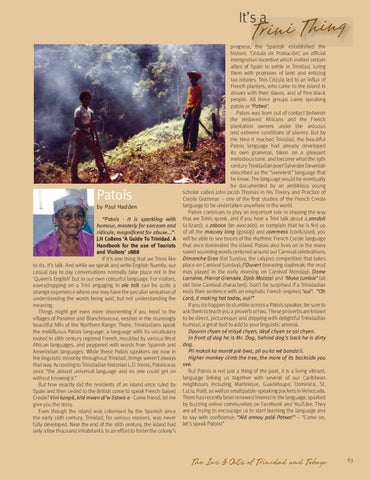It’s a
Trin i Thing
Patois by Paul Hadden “Patois - It is sparkling with humour, masterly for sarcasm and ridicule, magnificent for abuse...”J.H Collens ‘A Guide To Trinidad. A Handbook for the use of Tourists and Visitors’ 1888 If it’s one thing that we Trinis like to do, it’s talk. And while we speak and write English fluently, our casual day to day conversations normally take place not in the ‘Queen’s English’ but in our own colourful language. For visitors, eavesdropping on a Trini engaging in ole talk can be quite a strange experience where one may have the peculiar sensation of understanding the words being said, but not understanding the meaning. Things might get even more disorienting if you head to the villages of Paramin and Blanchisseuse, nestled in the stunningly beautiful hills of the Northern Range. There, Trinidadians speak the mellifluous Patois language, a language with its vocabulary rooted in 18th century regional French, moulded by various West African languages, and peppered with words from Spanish and Amerindian languages. While these Patois speakers are now in the linguistic minority throughout Trinidad, things weren’t always that way. According to Trinidadian historian L.O. Inniss, Patois was once “the almost universal language and no one could get on without knowing it.” But how exactly did the residents of an island once ruled by Spain and then ceded to the British come to speak French-based Creole? Vini konpè, kité mwen di’w listwa-a - Come friend, let me give you the story. Even though the island was colonised by the Spanish since the early 16th century, Trinidad, for various reasons, was never fully developed. Near the end of the 18th century, the island had only a few thousand inhabitants. In an effort to foster the colony’s
progress, the Spanish established the historic ‘Cédula de Población’; an official immigration incentive which invited certain allies of Spain to settle in Trinidad, luring them with promises of land and enticing tax rebates. This Cédula led to an influx of French planters, who came to the island in droves with their slaves, and of free black people. All three groups came speaking patois or ‘Patwa’. Patois was born out of contact between the enslaved Africans and the French plantation owners under the arduous and extreme conditions of slavery. But by the time it reached Trinidad, the beautiful Patois language had already developed its own grammar, taken on a pleasant melodious tone, and become what the 19th century Trinidadian poet Sylvester Devenish described as the “sweetest” language that he knew. The language would be eventually be documented by an ambitious young scholar called John Jacob Thomas in his Theory and Practice of Creole Grammar – one of the first studies of the French Creole language to be undertaken anywhere in the world. Patois continues to play an important role in shaping the way that we Trinis speak, and if you hear a Trini talk about a zandoli (a lizard), a zaboca (an avocado), or complain that he is fed up of all the mauvay lang (gossip) and commess (confusion), you will be able to see traces of the rhythmic French Creole language that once dominated the island. Patois also lives on in the many sweet sounding words centered around our Carnival celebrations; Dimanche Gras (Fat Sunday; the calypso competition that takes place on Carnival Sunday); J’Ouvert (meaning daybreak; the mud mas played in the early morning on Carnival Monday); Dame Lorraine, Pierrot Grenade, Djab Molassi and ‘Moko Jumbie’ (all old time Carnival characters). Don’t be surprised if a Trinidadian ends their sentence with an emphatic French inspired ‘oui’: “Oh Lord, it making hot today, oui!” If you do happen to stumble across a Patois speaker, be sure to ask them to teach you a proverb or two. These proverbs are known to be direct, picturesque and dripping with delightful Trinidadian humour; a great tool to add to your linguistic arsenal. Douvan chyen sé misyé chyen, dèyé chyen se sal chyen. In front of dog he is Mr. Dog, behind dog’s back he is dirty dog. Pli makak ka monté pié-bwa, pli ou ka wè bonda li. Higher monkey climb the tree, the more of its backside you see. But Patois is not just a thing of the past; it is a living vibrant, language linking us together with several of our Caribbean neighbours including Martinique, Guadeloupe, Dominica, St. Lucia, Haiti, as well as small patois-speaking pockets in Venezuela. There has recently been renewed interest in the language, sparked by buzzing online communities on Facebook and YouTube. They are all trying to encourage us to start learning the language and to say with confidence: “Alé annou palé Patwa!” – “Come on, let’s speak Patois!”
The Ins & Outs of Trinidad and Tobago
63
